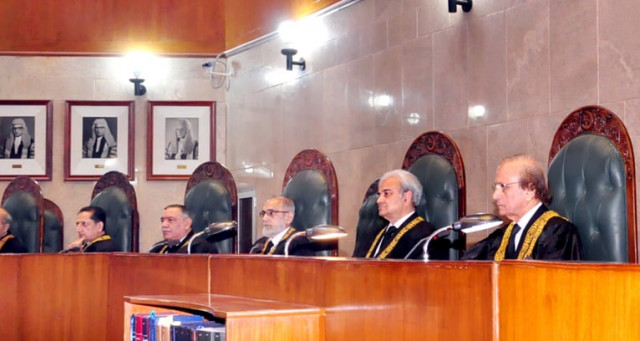Institutions need to work in harmony with one another: incoming CJP
Justice Mulk hopes to wipe out backlog of cases by the summer of 2015.

“In case, institutions do not respect the trichotomy of power, we fear that the rights of the people will be violated and disregarded”, Justice Mulk added, who takes oath as the new Chief Justice of Pakistan on Sunday.
On Friday, Justice Mulk addressed the Supreme Court’s full court reference on the eve of retirement of outgoing chief justice of Pakistan Tassaduq Hussain Jillani.
The incoming Chief Justice said that governance structure in Pakistan can only be strengthened when all the institutions of the state work in accordance with law and cautiously exercise the power held by them for betterment of the people.
“Courts may undertake judicial review and step in when the executive and legislature acts ultra-vires of the Constitution. In this regard an onerous responsibility has been placed on the judiciary which has to tread carefully while exercising the powers of judicial review.”
He focused his speech on resolving the miseries of ordinary litigants as well as avoiding the unnecessary interference in the affairs of other institutions during his short 13 month tenure.
Justice Mulk urged lawyers to assist the court in its endeavor to minimise problems of ordinary litigants by curbing undue delays.
“In the last about six months we have already decided more than half of the criminal cases pending before this court and we hope that by the summer of 2015 such backlog of criminal cases would be completely wiped out”
He also revealed that a similar sustained and concentrated effort was being planned for tackling the backlog of constitutional, civil, service, revenue and other cases and results in that regard would soon become apparent in the coming months.
Appreciating the judgment of outgoing chief justice on minorities’, Justice Mulk lamented that minorities in Pakistan are one such class of people, whose rights have escaped the concerns of policy makers for years, the area where the law proverbially slept.
“The task of the judiciary is a dispassionate reading of the law unaffected by personal biases. We need to remind ourselves that judges have to administer justice in accordance with law and not according to the personal sense of justice, as predictability and certainty are defining features of a sound judicial system”
The incoming chief justice reiterated that their primary responsibility was to “preserve, protect and defend the Constitution” rests upon the judiciary under the constitutional oath of office.
SC must exert constitutional authority to bolster democracy
Meanwhile, addressing the full court reference, outgoing CJ Jillani said that democracy can not endure if constitutional pledges and values do not bring about a positive change in the lives of the people and a constitutional culture is not nurtured.
“Supreme Court may exert its constitutional authority to bolster and sustain constitutional democracy and to guard against subversion of constitutional values while avoiding not only a constitutional breakdown but also an unseemly clash between institutions”
Justice Jillani further said that in a society afflicted with education deficit, steeped in a myopic view of faith, stricken by ethnic and sectarian divide and agonised by terror, the apex court not only has to enforce the constitutional values, while striking a balance between liberty and security but also act as a pedagogical institution participating in a national seminar, disseminating the constitutional values and thereby educating the people through its judgments.
“The challenges faced by the judiciary during the last few years has recharged the judiciary and it has emerged as an active pillar of State.”
Legal optimism for Justice Mulk’s tenure
Reacting to the incoming CJ’s maiden speech, Additional Attorney General Tariq Khokhar said that it was clear that during Justice Mulk’s his tenure, the policy of ‘judicial restraint’ will be continued rather than the policy of judicial activism which had become the hallmark of former chief justice Iftikhar Muhammad Chaudhry.
Senior lawyer Tariq Mahmood hoped that in the future further improvement will be witnessed in the discipline of the apex court’s proceedings as well as numbers of prisoners would be decreased in country’s jails as criminal cases are disposed.
Earlier, Attorney General for Pakistan Salman Aslam Butt, Pakistan Bar Council vice chairman Muhammad Ramzan Chaudhry and Supreme Court Bar Association president Kamran Murtaza have also addressed the full court reference.



















COMMENTS
Comments are moderated and generally will be posted if they are on-topic and not abusive.
For more information, please see our Comments FAQ